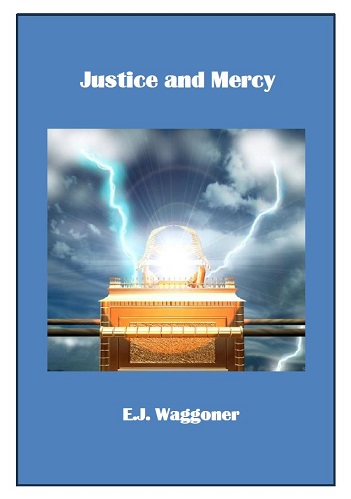The Godhead of Adventism or Mormonism?
"Godhead
"The Church's first article of faith states, 'We believe in God, the Eternal Father, and in His Son, Jesus Christ, and in the Holy Ghost.' These three beings make up the Godhead. They preside over this world and all other creations of our Father in Heaven.
"The true doctrine of the Godhead was lost in the apostasy that followed the Savior's mortal ministry and the deaths of His Apostles. This doctrine began to be restored when 14-year-old Joseph Smith received his First Vision (see Joseph Smith—History 1:17). From the Prophet's account of the First Vision and from his other teachings, we know that the members of the Godhead are three separate beings. The Father and the Son have tangible bodies of flesh and bones, and the Holy Ghost is a personage of spirit (see D&C 130:22).
"Although the members of the Godhead are distinct beings with distinct roles, they are one in purpose and doctrine. They are perfectly united in bringing to pass Heavenly Father's divine plan of salvation." (LDS.org)
-------------------------------------------------------------------------------------------------------------------
"Why aren't Mormons monotheists like true Christians?
This is a misleading question. All Christians, including Mormons, should recognize that when it comes to God, there is both a plurality and a oneness. The standard doctrine of the Trinity holds that there are three persons who are nevertheless one Being and one in substance. We believe that there are three persons who are three distinct Beings who are one. We differ in how we understand the oneness to be achieved. This quibbling seems irrelevant to many non-Christians, such as Muslims, many of whom are convinced that belief in God the Father, the Son, and the Holy Ghost makes all of us hopeless polytheists. So don't get too dogmatic about calling others polytheists because of a difference in understanding what 'one' means....
"Col. 2:9 teaches another relevant concept: that the fullness of the Godhead dwells bodily in Christ - i.e., He has a body, and fully represents and shares in the glory of the entire Godhead. When He speaks, He speaks for all three, representing them fully. I agree that the concept of the Godhead is not part of modern "normative" Christianity and that those in these wonderful but incomplete traditions may grow up never hearing of the Godhead, but I see that only as further evidence of the loss that has occurred among them over time, not as evidence that we are not Christians....
"Having a body does not limit God. He created it and we can presume it is a powerful tool, just as our vastly inferior, mortal bodies are great blessings to us. He has a body, as does Christ. They are distinct beings, yet one, just as the followers of Christ should be one (John 17:20-23) - meaning one in heart, mind, intent, will, etc. - but not one substance.
"While I feel that the LDS doctrine of the nature of God is purely Biblical, there is room for disagreement. But using that doctrinal disagreement to label someone as non-Christian is grossly improper. It would certainly rule out many of the earliest Christians and, in my opinion, the writers of the Bible themselves.
"For you and others who may have grown up with the doctrine of the Trinity, I think it is very difficult to realize that this doctrine is one of several possible interpretations of the nature of God, one of many possible ways of interpreting the Biblical record. Many Trinitarians are taught that the post-Biblical creeds they grew up with are IDENTICAL to Biblical teachings, but they are not. The doctrine of the Trinity can be viewed as consistent with many Bible passages, but you need to realize that there are other possibilities. And once you accept that, it then becomes possible to realize that the earliest Christians understood things much differently, and that there are many passages in the Bible that seem strongly inconsistent with the Trinity. In fact, you may even come to realize, as I do, that revelation to Joseph Smith about the nature of God is much closer to what the earliest Christians understood than anything in the post-Biblical creeds that defined a God of the philosophers, not the living, tangible Christ in whose physical image we are created, and His glorious Father, who looks like His Son and is One with His Son - in much the same way that Christians should be one with each other....
"Here are some comments from a Catholic correspondent received in 2001:
'Your site is very well developed and you have a lot of energy. But please understand that the LDS Church is not a Christian Church. It does not believe many of the doctrines that Christians believe.
'Peter, Paul, John and the rest of the Bible clearly indicates one God. They were all Jews were they not? If they taught a gospel of multiple gods wouldn't it be much clearer and a major restatement? You say that the doctrine was not taught until much later. How much later, please be specific? I asked you if you considered Clement, Ignatius, Justin Martyr, and Irenaeus apostates. You did not answer. All these early Fathers taught the Trinity and Apostolic succession. They were disciples of the Apostles. Have you bothered to read their writings?'
"Latter-day Saints fully subscribe to the concept of the oneness of God. The Book of Mormon also affirms that the Father, Son, and Holy Ghost are ONE GOD. But the Bible and other scriptures also fully affirm that the Son is distinct from the Father, yet is God, and that the Holy Ghost is also distinct, and yet can be called God - apparently making three Gods. The issue, then is in what sense are three distinct persons one God? That's where we differ. Most modern Christians rely on a post-Biblical formulation that asserts the three persons are nevertheless one substance and one Being - phraseology not found in the Bible but claimed to be consistent with the Bible. We believe that the oneness of God lies in their perfect unity of mind, purpose, and will, wherein each can represent the others....
"We definitely believe in Christ as God, the Father as God, and the Holy Ghost as God. Accepting that is not necessarily the same as accepting the metaphysical doctrines of the Trinity. We believe in the unified Godhead, the One Eternal God of the Father, Son, and Holy Ghost as three distinct Beings. That position seems much more in harmony with the writings of the Bible than, say, the Athanasian Creed. (See here)



